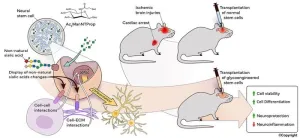(Press-News.org) AI holds the potential to help doctors find early markers of disease and policymakers to avoid decisions that lead to war. But a growing body of evidence has revealed deep flaws in how machine learning is used in science, a problem that has swept through dozens of fields and implicated thousands of erroneous papers.
Now an interdisciplinary team of 19 researchers, led by Princeton University computer scientists Arvind Narayanan and Sayash Kapoor, has published guidelines for the responsible use of machine learning in science.
“When we graduate from traditional statistical methods to machine learning methods, there are a vastly greater number of ways to shoot oneself in the foot,” said Narayanan, director of Princeton’s Center for Information Technology Policy and a professor of computer science. “If we don’t have an intervention to improve our scientific standards and reporting standards when it comes to machine learning-based science, we risk not just one discipline but many different scientific disciplines rediscovering these crises one after another.”
The authors say their work is an effort to stamp out this smoldering crisis of credibility that threatens to engulf nearly every corner of the research enterprise. A paper detailing their guidelines appeared May 1 in the journal Science Advances.
Because machine learning has been adopted across virtually every scientific discipline, with no universal standards safeguarding the integrity of those methods, Narayanan said the current crisis, which he calls the reproducibility crisis, could become far more serious than the replication crisis that emerged in social psychology more than a decade ago.
The good news is that a simple set of best practices can help resolve this newer crisis before it gets out of hand, according to the authors, who come from computer science, mathematics, social science and health research.
“This is a systematic problem with systematic solutions,” said Kapoor, a graduate student who works with Narayanan and who organized the effort to produce the new consensus-based checklist.
The checklist focuses on ensuring the integrity of research that uses machine learning. Science depends on the ability to independently reproduce results and validate claims. Otherwise, new work cannot be reliably built atop old work, and the entire enterprise collapses. While other researchers have developed checklists that apply to discipline-specific problems, notably in medicine, the new guidelines start with the underlying methods and apply them to any quantitative discipline.
One of the main takeaways is transparency. The checklist calls on researchers to provide detailed descriptions of each machine learning model, including the code, the data used to train and test the model, the hardware specifications used to produce the results, the experimental design, the project’s goals and any limitations of the study’s findings. The standards are flexible enough to accommodate a wide range of nuance, including private datasets and complex hardware configurations, according to the authors.
While the increased rigor of these new standards might slow the publication of any given study, the authors believe wide adoption of these standards would increase the overall rate of discovery and innovation, potentially by a lot.
“What we ultimately care about is the pace of scientific progress,” said sociologist Emily Cantrell, one of the lead authors, who is pursuing her Ph.D. at Princeton. “By making sure the papers that get published are of high quality and that they’re a solid base for future papers to build on, that potentially then speeds up the pace of scientific progress. Focusing on scientific progress itself and not just getting papers out the door is really where our emphasis should be.”
Kapoor concurred. The errors hurt. “At the collective level, it’s just a major time sink,” he said. That time costs money. And that money, once wasted, could have catastrophic downstream effects, limiting the kinds of science that attract funding and investment, tanking ventures that are inadvertently built on faulty science, and discouraging countless numbers of young researchers.
In working toward a consensus about what should be included in the guidelines, the authors said they aimed to strike a balance: simple enough to be widely adopted, comprehensive enough to catch as many common mistakes as possible.
They say researchers could adopt the standards to improve their own work; peer reviewers could use the checklist to assess papers; and journals could adopt the standards as a requirement for publication.
“The scientific literature, especially in applied machine learning research, is full of avoidable errors,” Narayanan said. “And we want to help people. We want to keep honest people honest.”
# # #
The paper, “Consensus-based recommendations for machine-learning-based science,” published on May 1 in Science Advances, included the following authors:
Sayash Kapoor, Princeton University;
Emily Cantrell, Princeton University;
Kenny Peng, Cornell University;
Thanh Hien (Hien) Pham, Princeton University;
Christopher A. Bail, Duke University;
Odd Erik Gundersen, Norwegian University of Science and Technology;
Jake M. Hofman, Microsoft Research;
Jessica Hullman, Northwestern University;
Michael A. Lones, Heriot-Watt University;
Momin M. Malik, Center for Digital Health, Mayo Clinic;
Priyanka Nanayakkara, Northwestern;
Russell A. Poldrack, Stanford University;
Inioluwa Deborah Raji, University of California-Berkeley;
Michael Roberts, University of Cambridge;
Matthew J. Salganik, Princeton University;
Marta Serra-Garcia, University of California-San Diego;
Brandon M. Stewart, Princeton University;
Gilles Vandewiele, Ghent University; and
Arvind Narayanan, Princeton University.
END
Science has an AI problem. This group says they can fix it.
32 questions to tamp a smoldering crisis of confidence
2024-05-01
ELSE PRESS RELEASES FROM THIS DATE:
Study shows a tale of two social media platforms for Donald Trump
2024-05-01
BUFFALO, N.Y. – Truth Social was more effective at driving news attention toward Donald Trump during the 2022 midterm election cycle than Twitter (now known as X) was during the 2016 primary election season, a pattern driven mostly by partisan media on the left and the right, according to a new paper by a University at Buffalo communication researcher.
But that success had limits.
Journalists covered Trump’s social media use differently during those times and across those platforms, directly embedding his Truth Social posts into their stories far less frequently than was the case with his tweets in 2016.
The findings published in the Journal of Information ...
Roadmap to close the carbon cycle
2024-05-01
RICHLAND, Wash.--A major approach to achieving net-zero carbon emissions relies on converting various parts of the economy, such as personal vehicles and heating, to run via electricity generated from renewable sources. But carbon cannot be removed from all parts of society. Plastics, ubiquitous in the modern world, cannot be decarbonized because they are made of carbon-based molecules.
Led by chemist Wendy Shaw of Pacific Northwest National Laboratory (PNNL), a multi-institutional effort has produced a new roadmap to reducing emissions in hard-to-electrify segments of the economy. The multifaceted approach includes developing non-carbon fuels, ...
The Protein Society announces its 2024 award recipients
2024-05-01
LOS ANGELES, CA – The Protein Society, the premier international society dedicated to supporting protein research, announces the winners of the 2024 Protein Society Awards, which will be conferred at the 38th Anniversary Symposium, July 23 – 26, 2024, in Vancouver, Canada. Plenary talks from select award recipients will take place throughout the 3.5-day event. The winners’ scientific accomplishments, described by their nominators below, demonstrate their lasting impact on protein science.
The ...
UMSOM preclinical study finds novel stem cell therapy boosts neural repair after cardiac arrest
2024-05-01
Researchers at the University of Maryland School of Medicine (UMSOM) have identified an innovation in stem cell therapy to regenerate neural cells in the brain after cardiac arrest in an animal model. The study led by Xiaofeng Jia, BM, MS, PhD, FCCM, Professor of Neurosurgery, found that the application of modified sugar molecules on human neural stem cells improved the likelihood of the therapy's success. The application of these sugar molecules both enhanced the stem cells' proliferation and their transition into neurons to help repair critical connections in the brain. The finding could eventually lead to improved recovery of patients ...
With huge patient dataset, AI accurately predicts treatment outcomes
2024-05-01
COLUMBUS, Ohio – Scientists have designed a new artificial intelligence model that emulates randomized clinical trials at determining the treatment options most effective at preventing stroke in people with heart disease.
The model was front-loaded with de-identified data on millions of patients gleaned from health care claims information submitted by employers, health plans and hospitals – a foundation model strategy similar to that of generative AI tools like ChatGPT.
By pre-training the model on a huge cache of general ...
Organ transplant drug may slow Alzheimer’s disease progression in individuals with seizures
2024-05-01
PHILADELPHIA— Protein imbalances that increase brain cell excitability may explain why individuals with Alzheimer’s disease (AD) who also experience seizures demonstrate more rapid cognitive decline than those who do not experience seizures. These imbalances may be present in the brains of individuals before the onset of AD symptoms.The new findings, from a research team at the University of Pennsylvania’s Perelman School of Medicine, are published this week in Brain.
The team found ...
Ochsner Health hospitals and partners earn an ‘A’ Spring 2024 Hospital Safety Grade from the Leapfrog Group
2024-05-01
NEW ORLEANS, La. – Dedicated to excellence in patient safety, several Ochsner Health hospitals and partners throughout Louisiana and Mississippi have earned an “A” Hospital Safety Grade from The Leapfrog Group, a national nonprofit watchdog. Leapfrog assigns an “A,” “B,” “C,” “D” or “F” grade to general hospitals across the country based on over 30 measures of errors, accidents, injuries and infections as well as the systems hospitals ...
FathomVerse mobile game inspires a new wave of ocean exploration
2024-05-01
A new mobile game launching today allows anyone with a smartphone or tablet to take part in ocean exploration and discovery. Welcome to FathomVerse. Now available for download on the App Store and Google Play, FathomVerse allows players to interact with real underwater images to improve the artificial intelligence that helps researchers study ocean life. The game combines immersive imagery, compelling gameplay, and cutting-edge science to inspire a new wave of ocean explorers.
Scientists are collecting massive amounts of images and video to study marine life and assess ocean ...
A “cosmic glitch” in gravity
2024-05-01
A group of researchers at the University of Waterloo and the University of British Columbia have discovered a potential “cosmic glitch” in the universe’s gravity, explaining its strange behaviour on a cosmic scale.
For the last 100 years, physicists have relied upon Albert Einstein’s theory of “general relativity” to explain how gravity works throughout the universe. General relativity, proven accurate by countless tests and observations, suggests that gravity impacts ...
The women’s health initiative randomized trials and clinical practice
2024-05-01
About The Study: For postmenopausal women, the Women’s Health Initiative (WHI) randomized clinical trials do not support menopausal hormone therapy to prevent cardiovascular disease or other chronic diseases. Menopausal hormone therapy is appropriate to treat bothersome vasomotor symptoms among women in early menopause, without contraindications, who are interested in taking hormone therapy. The WHI evidence does not support routine supplementation with calcium plus vitamin D for menopausal women to prevent fractures or a low-fat diet with increased fruits, vegetables, and grains to prevent ...
LAST 30 PRESS RELEASES:
Scientists identify smooth regional trends in fruit fly survival strategies
Antipathy toward snakes? Your parents likely talked you into that at an early age
Sylvester Cancer Tip Sheet for Feb. 2026
Online exposure to medical misinformation concentrated among older adults
Telehealth improves access to genetic services for adult survivors of childhood cancers
Outdated mortality benchmarks risk missing early signs of famine and delay recognizing mass starvation
Newly discovered bacterium converts carbon dioxide into chemicals using electricity
Flipping and reversing mini-proteins could improve disease treatment
Scientists reveal major hidden source of atmospheric nitrogen pollution in fragile lake basin
Biochar emerges as a powerful tool for soil carbon neutrality and climate mitigation
Tiny cell messengers show big promise for safer protein and gene delivery
AMS releases statement regarding the decision to rescind EPA’s 2009 Endangerment Finding
Parents’ alcohol and drug use influences their children’s consumption, research shows
Modular assembly of chiral nitrogen-bridged rings achieved by palladium-catalyzed diastereoselective and enantioselective cascade cyclization reactions
Promoting civic engagement
AMS Science Preview: Hurricane slowdown, school snow days
Deforestation in the Amazon raises the surface temperature by 3 °C during the dry season
Model more accurately maps the impact of frost on corn crops
How did humans develop sharp vision? Lab-grown retinas show likely answer
Sour grapes? Taste, experience of sour foods depends on individual consumer
At AAAS, professor Krystal Tsosie argues the future of science must be Indigenous-led
From the lab to the living room: Decoding Parkinson’s patients movements in the real world
Research advances in porous materials, as highlighted in the 2025 Nobel Prize in Chemistry
Sally C. Morton, executive vice president of ASU Knowledge Enterprise, presents a bold and practical framework for moving research from discovery to real-world impact
Biochemical parameters in patients with diabetic nephropathy versus individuals with diabetes alone, non-diabetic nephropathy, and healthy controls
Muscular strength and mortality in women ages 63 to 99
Adolescent and young adult requests for medication abortion through online telemedicine
Researchers want a better whiff of plant-based proteins
Pioneering a new generation of lithium battery cathode materials
A Pitt-Johnstown professor found syntax in the warbling duets of wild parrots
[Press-News.org] Science has an AI problem. This group says they can fix it.32 questions to tamp a smoldering crisis of confidence


